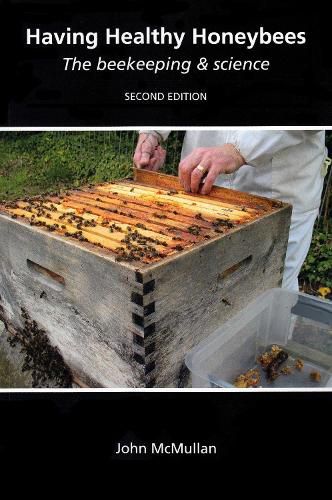Readings Newsletter
Become a Readings Member to make your shopping experience even easier.
Sign in or sign up for free!
You’re not far away from qualifying for FREE standard shipping within Australia
You’ve qualified for FREE standard shipping within Australia
The cart is loading…






This title is printed to order. This book may have been self-published. If so, we cannot guarantee the quality of the content. In the main most books will have gone through the editing process however some may not. We therefore suggest that you be aware of this before ordering this book. If in doubt check either the author or publisher’s details as we are unable to accept any returns unless they are faulty. Please contact us if you have any questions.
There has been a change in the beekeeping environment since the first edition in 2012. Today there is a heightened concern about global warming, the natural environment, biodiversity and the need to be guided by science. Among beekeepers there is a greater awareness of these issues with a shift towards sustainable beekeeping; locally-adapted colonies, reduced use of chemicals and concern for pollinators and forage. These concerns are reflected in this second edition. The increased engagement of beekeepers and the questioning of otherwise accepted practices has prompted the title of this edition, Having Healthy Honeybees - the beekeeping & science. This edition both updates the first and extends its scope. Aim is to help beekeepers establish healthy colonies.Emphasis on proper set-up and keeping it simple.Diseases are dealt with in a concise format.New chapters, The Bees & Sustainable Colonies and
Forage & Honey.
There are over 220 references many on open access.
About the Author
John McMullan keeps honeybee colonies in North County Dublin and has an out-apiary in County Galway. He was Honorary Secretary of his local beekeeping Association for twenty five years and has been in contact with many members' colonies over the years. He is an engineer by profession and in 2007 received a doctorate in Zoology (parasitology) from Trinity College Dublin. His particular interest is in the parasites of the honeybee, mainly parasitic mites, and has authored several scientific papers.
$9.00 standard shipping within Australia
FREE standard shipping within Australia for orders over $100.00
Express & International shipping calculated at checkout
This title is printed to order. This book may have been self-published. If so, we cannot guarantee the quality of the content. In the main most books will have gone through the editing process however some may not. We therefore suggest that you be aware of this before ordering this book. If in doubt check either the author or publisher’s details as we are unable to accept any returns unless they are faulty. Please contact us if you have any questions.
There has been a change in the beekeeping environment since the first edition in 2012. Today there is a heightened concern about global warming, the natural environment, biodiversity and the need to be guided by science. Among beekeepers there is a greater awareness of these issues with a shift towards sustainable beekeeping; locally-adapted colonies, reduced use of chemicals and concern for pollinators and forage. These concerns are reflected in this second edition. The increased engagement of beekeepers and the questioning of otherwise accepted practices has prompted the title of this edition, Having Healthy Honeybees - the beekeeping & science. This edition both updates the first and extends its scope. Aim is to help beekeepers establish healthy colonies.Emphasis on proper set-up and keeping it simple.Diseases are dealt with in a concise format.New chapters, The Bees & Sustainable Colonies and
Forage & Honey.
There are over 220 references many on open access.
About the Author
John McMullan keeps honeybee colonies in North County Dublin and has an out-apiary in County Galway. He was Honorary Secretary of his local beekeeping Association for twenty five years and has been in contact with many members' colonies over the years. He is an engineer by profession and in 2007 received a doctorate in Zoology (parasitology) from Trinity College Dublin. His particular interest is in the parasites of the honeybee, mainly parasitic mites, and has authored several scientific papers.